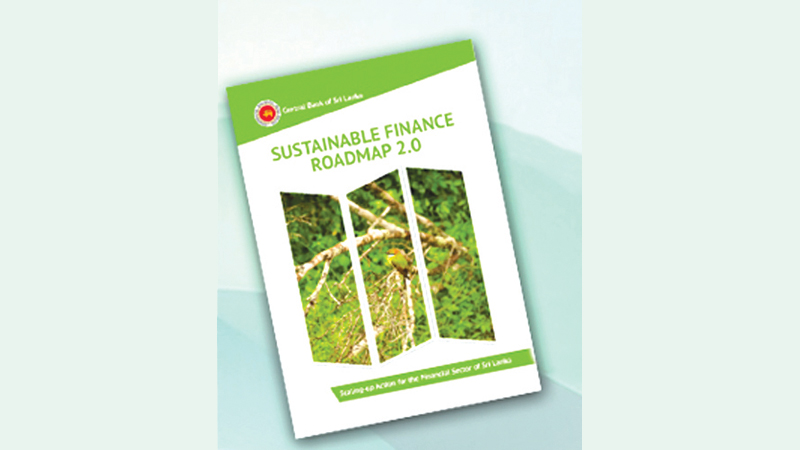Roadmaps to achieve goals are important but its implementation by the stakeholders is much more important, said Global Coordinator, Sustainable Banking and Finance Network (SBFN), Rong Zhang stressing on the importance of achieving the objectives of the Sustainable Finance Roadmap launched by the Central Bank last week.
The Central Bank of Sri Lanka (CBSL) launched the Sustainable Finance Roadmap 2.0 on May 5 marking a milestone in its continued efforts to foster a climate-resilient and socially inclusive financial system.
Commending Sri Lanka’s achievement of 80 percent of the goals of the roadmap Zhang hailed the inclusion of the social dimension by the Central Bank in the ‘Sustainable Finance Roadmap 2.0’.
In his keynote address Central Bank Governor Dr. Nandalal Weerasinghe said around 130 million of the world population will be pushed into poverty if the climate challenges persists which makes it all the more important for the financial sector in e Sri Lanka to gear up to mobilise an estimated US $ 10.85 billion by 2030 to meet the country’s climate commitments.
He said the cost of inaction will be enormous to the economy and intense on micro small and medium (MSMEs) and other vulnerable sectors as climate risks intensify.
Terming the roadmap as a “critical step forward” in building resilience and long-term sustainability in the country’s financial sector and broader economy the governor highlighted the need to integrate sustainable finance and green financing in Sri Lanka as the country faces unprecedented climate and environmental risks.
Commending the team behind the hard work Dr. Weerasinghe lauded the inclusion of the social dimension in the Roadmap.
While also praising the progress made in facing new climate related challenges in the past years he said future challenges in no way could be taken for granted.
World Bank Country Manager for Sri Lanka and the Maldives, Gevorg Sargsyan commanded the leadership of the Central Bank during the last six years to critically innovate and keep the long term vision and commitment to green financing despite multiple crises.
“Focusing on the welfare of MSMEs which is the future growth of Sri Lanka accounting for around 50 percent of the GDP and work force in the country is crucial,” he said, while highlighting the importance of focusing on social inclusivity and sustained efforts to bring all segments of society to gain from sustainable finance initiatives.
Recognising the growing implications of climate-related risks on price stability and financial system stability, CBSL introduced the first Sustainable Finance Roadmap in 2019, which provided foundational guidance to financial institutions on managing environmental, social, and governance (ESG) risks while encouraging financing for green and inclusive economic activities.
In light of evolving global developments, increasing access to climate-focused financing, and broader recognition of the social dimension of sustainability, CBSL developed the Sustainable Finance Roadmap 2.0 for the period 2025–2029, with technical and financial support from the International Finance Corporation (IFC) in partnership with the European Union, under the Accelerating Climate Smart and Inclusive Infrastructure in South Asia (EU-ACSIIS) program.
The Roadmap 2.0 was crafted in close collaboration with key stakeholders, including Securities and Exchange Commission of Sri Lanka (SEC), the Insurance Regulatory Commission of Sri Lanka (IRCSL), the Colombo Stock Exchange (CSE), the Sri Lanka Banks’ Association (SLBA), The Finance Houses Association of Sri Lanka (FHA), financial institutions and government bodies.
Focusing on Sri Lanka’s financial sector, the Roadmap 2.0 outlines a comprehensive set of prioritised actions for banking, non-banking, capital market, and insurance sectors. These actions are geared toward financing sustainable development, strengthening the management of environmental and social risks, enhancing reporting and disclosures, and improving governance and coordination across institutions.
The Central Bank Governor said that building a truly sustainable financial ecosystem in Sri Lanka is a collective endeavor – one that IFC has been a part of from inception, and remains committed in working together with the Central Bank of Sri Lanka and industry stakeholders to bring the shared vision of the Sustainable Finance Roadmap 2.0 to fruition.
The Central Bank of Sri Lanka joined the Sustainable Banking and Finance Network (SBFN) supported by the International Finance Co-operation (IFC) in 2016 which consists of central banks, banking regulators and banking associations from 66 countries committed to improve environmental, social and governance risk (ESG) management in emerging markets including climate change mitigation and adaptation.
Sri Lanka faces significant exposure to climate change. If no action is taken, the losses related to natural disasters are projected to triple by 2050 to reach 1.2% of GDP (from 0.4% today – equivalent to $300 million).
Reflecting the soaring inflation and the sharp contraction of the economy, the poverty rate more than doubled between 2019 and 2022, rising from 11.3% to 25.0%.6 By 2023, approximately seven million Sri Lankans – almost one-third of the population – were considered poor.
Unemployment remains high in Sri Lanka, especially, with an unemployment rate that stands at approximately 22% among the youth and young graduates, compared to a global rate of 5%, in 2023.7 Income disparity has also widened, with urban areas recovering faster than rural regions.







